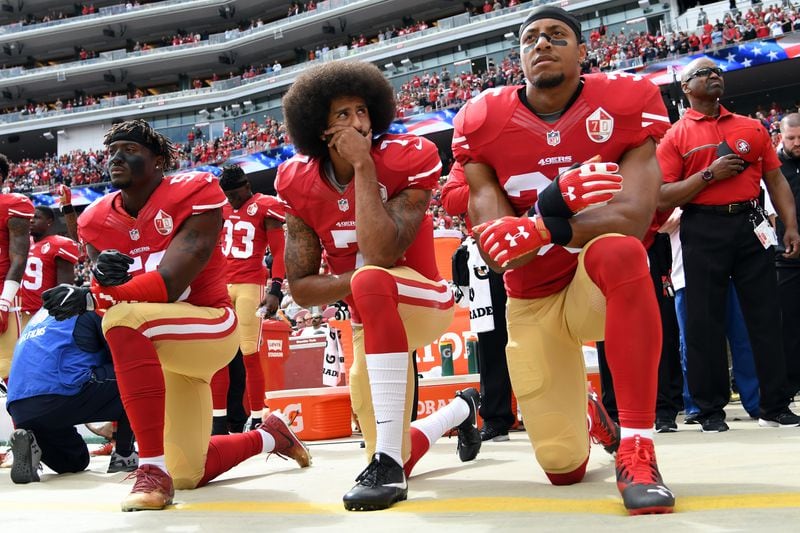Even if you live in Georgia, chances are, you never heard of Truett McConnell University.
But this week the private Southern Baptist college in Cleveland, Ga. joined the national response to Nike’s ad campaign featuring Colin Kaepernick.
Emir Caner, the president of Truett McConnell announced this week that the university would cut ties with the global apparel company, which supplies university t-shirts and other goods to the campus bookstore.
Caner said that Nike “mocks our troops” with its support of Kaepernick, a former professional football player known for kneeling during the pre-game national anthem to protest police brutality against minorities.
Caner also said Kaepernick, who has been out of football for two years, was "mocking" law enforcement and the military by protesting during the national anthem.
Caner did not returns calls from The Atlanta Journal-Constitution for comment on this story.
Caner, who took over at Truett McConnell in 2008, is a former Muslim well-known in conservative religious circles as a defender of Christianity.
In a statement released on the school’s website, Caner noted that his wife was raised “under the oppression of socialistic communism,” and only became a citizen five years ago.
“America has sacrificially given my family the freedoms we enjoy today,” Caner said. “For Nike to then hire Colin Kaepernick, a person known for wearing pigs on his socks, mocking law enforcement, kneeling against our flag, and mocking our troops, is reprehensible to my family and to the Truett McConnell family.”
Tucked away high in north Georgia in White County, the university enrolls about 2,100 students. Founded in 1946 and affiliated with the Georgia Baptist Convention, the school’s 13 athletic teams actually wear Adidas and compete in the National Association of Intercollegiate Athletics (NAIA).
The Nike ban will primarily impact the campus book store, where between $10,000 and $20,000 worth of Nike-branded school t-shirts, hats and sweatshirts are sold annually.
Nike’s new Kaepernick ad, which debuted on t.v. last week and has been posted on billboards around the country, pictures the former Super Bowl quarterback with the words, “Believe in something, even if it means sacrificing everything.”
Kaepernick hasn’t played in the NFL since 2016, but his presence as an American icon is still strong, yet polarizing.
»RELATED: Investing in Nike and students: Austell pastor encourages young members to ‘Just Do It’
President Donald Trump, who has been a vocal opponent of Kaepernick and the fact that NFL players have been kneeling, tweeted his opposition to Nike.
On the day after the company announced that Kaepernick would be the new face of the “Just Do It,” campaign, Nike lost $4 billion in market value. But by Monday afternoon, stock prices were up two percent and the company was trading at $81.80, returning to pre-Kaepernick levels.
Following the ad’s release, another tiny school, The College of the Ozarks, also banned Nike. At a weekend women’s volleyball match, the team wore plain gray t-shirts with the school’s name printed on the back.
Jerry Falwell Jr., the president of Liberty University and a close Trump ally, told USA Today Sports that the Kaepernick decision might cause what several publications have labeled the “Most Conservative College in America,” to reconsider its relationship with Nike.
“If Nike really does believe that law enforcement in this country is unfair and biased, I think we will look around,” said Falwell, who just signed a lengthy deal with Nike through 2024. “If we have a contract, we’ll honor it, but we strongly support law enforcement and strongly support our military and veterans who died to protect our freedoms and if the company really believes what Colin Kaepernick believes, it’s going to be hard for us to keep doing business with them.”
Also, this week, Kenner, La. Mayor Ben Zahn issued a controversial memo banning the purchase and use of any Nike products at the city's booster clubs and recreation departments.
In a statement released Monday, Zhan said the ban would protect the city's taxpayers from promoting Nike’s "political agenda."
"My internal memo draws the line on letting companies profit from taxpayers by espousing political beliefs. My decision disallowing Nike from profiting from our taxpayers while they are using their powerful voice as a political tool is my message," Zhan said.
"This government will not let taxpayer dollars be used to promote a company's or individual's political position, platform or principle,” Zhan said. “That's my position as a matter of fairness to all."
Believe in something, even if it means sacrificing everything. #JustDoIt pic.twitter.com/SRWkMIDdaO
— Colin Kaepernick (@Kaepernick7) September 3, 2018
But losing those schools will hardly make a dent in Nike’s bottom line. In March, Nike extended a contract with the NFL to supply all 32 teams with uniforms through 2028.
In the SEC, 10 of the 14 teams wear Nike, including the University of Alabama and the University of Georgia, which signed a $40.8 million, 10-year extension with the company in 2015.
In the Atlantic Coast Conference, Duke University and the University of North Carolina are among nine schools that wear the Swoosh.
Truett McConnell’s Caner said while students will still be allowed to wear Nike on campus, all of the profits from the remaining Nike gear sold in the campus store will be donated to Wounded Warriors and the Fraternal Order of Police.”
“If Nike chooses to apologize to our troops and to our law enforcement officers, then – and only then – will TMU reconsider their brand,” Caner said. “In the meanwhile, let us honor true heroes, those who protect us daily, some even sacrificing their own lives. They are the true heroes.”







